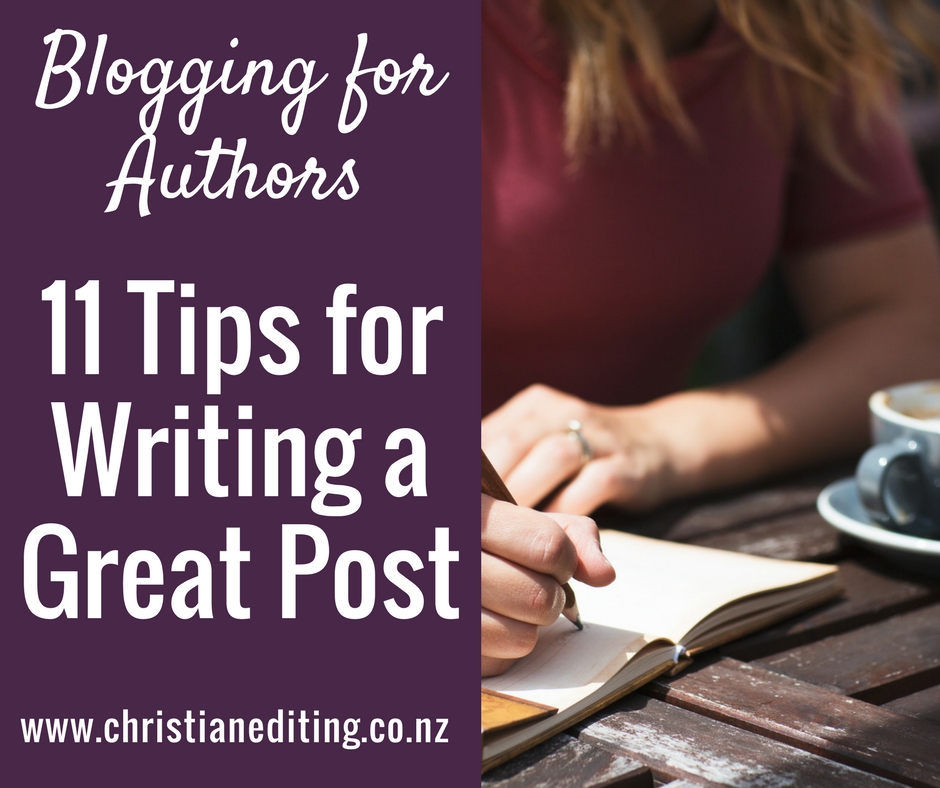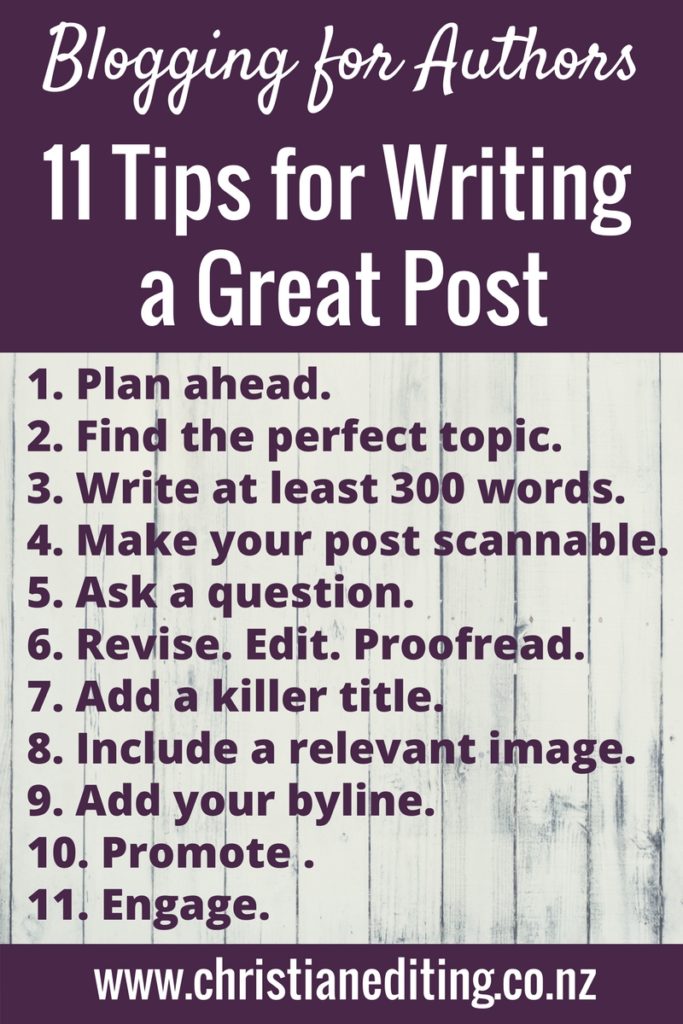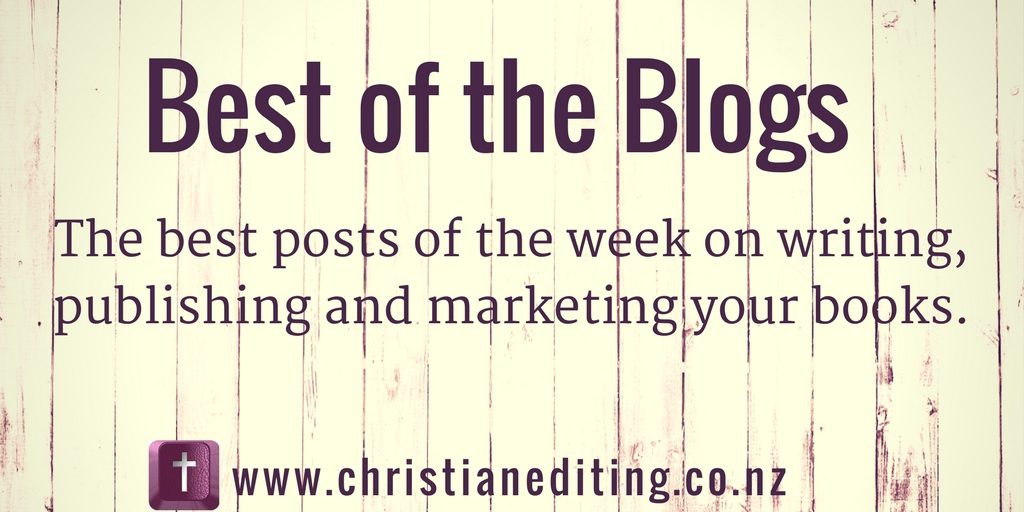Marketing. It’s the part of writing and publishing that authors enjoy least (well, most authors). But marketing is a necessary evil no matter whether you are trade published or self published. And a solid author platform—including a website and maybe a blog—is the foundation of good author marketing.
If even the thought of establishing an author platform fills you with dread … I can help. Click here to sign up to be notified about my March Marketing Challenge: Kick Start Your Author Platform.
But today I’m here to share about blogging for authors: my top 11 tips for writing a great blog post.
1. Plan Ahead
Yes, I know this sounds boring. But it will cut down on your blogging stress in two ways because it means you won’t be scrambling to write and edit a blog post at the last minute. Planning ahead also means you can write when the urge hits you … even if that’s several weeks ahead of your scheduled post date. As an example, I’m drafting this post on 22 November. I know December is going to be busy, so I’m trying to get ahead while I can.
It gives me a good feeling to check the calendar on Monday morning and find all the posts are scheduled for the week. All I have to do is promote them (see point 10 below).
2. Find the Perfect Topic
Sometimes you’re writing a blog post with a specific goal in mind: to share a cover reveal, a pre-order, a new release, or a specific time-sensitive promotion. These are easy posts to plan and write ahead of schedule, and should be part of your regular book launch marketing plan.
Sometimes you’re writing a post that has to fit a particular theme.
But more often you’re faced with a blank slate. I find those blank slate posts harder to write than when I’ve got a topic in mind. So … plan ahead. Plan out what topics you’d like to cover and when. Then you can write to cover those topics, or (if the muse hits you) you can write to please the muse.
What makes a great blog post topic? I suggest choosing topics that:
- Interest you (so you’re going to enjoy writing it)
- Are not going to date quickly (so you can continue to promote the post in the future).
- Are relevant to your target audience. You do know your target audience, right? Do they ever ask questions? Yes? Then write an answer. You’re likely to get the same questions over and over, and having the answer in a blog post means you can direct future askers to the post.
(Kick Start Your Author Platform has more great tips on choosing the perfect post topic.)
3. Write at least 300 words
One of our objectives as writers is to be read. Which means writing words people want to read. But first people have to find what you’ve written. This means making your blog post as appealing to Google (and other search engines) as it is to your target reader.
Which means writing a blog post that’s at least 300 words long. More words are better, but only if they are good words. No padding!
(P.S. In a group blog, that’s 300 or more words of content. Not 300 words including your bio.)
4. Make Your Post Scannable
As you write, make your post scannable. Many people read blog posts via a reader (such as Feedly), or on a mobile or tablet.
In an online world, scannable equals readable.
To make your blog post scannable, use:
- Short paragraphs (no more than four lines).
- Headings and subheadings.
- Bullet points or lists where relevant. Like here.
5. Ask a Question
As bloggers, we need to engage our readers, to keep them coming back. A great way of doing this is to ask a question.
This could be like my Bookish Question, or like #FirstLineFriday posts (what’s the first line of the book nearest you?).
Or you could ask a question that’s relevant to theme of your post. If the post is sharing your favourite novels, ask your readers their favourite novels. If you’re about Christmas, ask your readers to share their favourite Christmas memory. You get the idea.
The blogs I enjoy reading most are generally conversations where the comments are as important as the blog itself. So work out how you can turn your blog post into a conversation.
6. Revise. Edit. Proofread
We’re writers. We can do this. (If you can’t, Christian Editing Services can help you!)
7. Add a Killer Title
Feedly delivers me over 100 blog posts every single day. I don’t have time to read 100 blog posts. No one does. So how do I decide which posts to read? Based on the title.
Some people don’t want to use clickbaity titles such as 11 Tips for Writing a Great Blog Post. However, it’s only clickbaity if the post doesn’t actually deliver on the promise (or makes you click through 32 screens to get the 11 points).
Also, I’m reliably informed (thanks, Margie Lawson) that people subconsciously like numbered posts, because the numbers show us how much longer until the end of the post (not long now, people).
8. Include a Relevant Image
People like images. Search engines like images. Social media likes images—experts will tell you posts with images get more attention.
Include images. (But make sure you are using them legally.)
Your main image should be centred at the very top of the post. This is the image Blogger will pick up for social media shares (if you use WordPress, you can select a Featured Image. WordPress will display that at the top of your post, and use it for social media shares).
Intersperse images throughout a longer post—it breaks up the text and makes it more readable.
If you’re posting on a group blog like ACW, include your author photo, bio, and social media links at the bottom of the post.
9. Add Your Byline
Tell your readers who wrote the post. This is especially important if you’re writing for a group blog with multiple contributors. Some people will choose to read the post because you wrote it. Make it easy for them to know they want to read this post.
10. Promote Promote Promote
Note: promote promote promote does not mean spam spam spam.
Promoting means sharing your post with your target audience using relevant social networks.
If your post is about your multi-author romance giveaway, share in places where romance readers congregate (hint: not LinkedIn).
I use Buffer to share to Facebook, Google+, Instagram, Pinterest, and Twitter—Buffer’s Power Scheduler means I can even schedule multiple posts at once. A few clicks, and it’s done, with a unique message for each network (e.g. one or two #hashtags on Twitter, but more on Instagram).
Why these networks?
- For my reader-writer-reviewer posts, my target reader is on Facebook, Instagram, and Pinterest. Many are also on Twitter, and it takes only a few extra seconds to get Buffer to share to Twitter as well.
- For my writer-editor posts, my target audience is on Facebook, Pinterest, and Twitter. The beauty of Pinterest is that people can follow specific Boards, so people who aren’t interested in writing can choose not to follow my writing-related Boards.
I share on Google+ because that is indexed for SEO purposes. Translated: sharing to Google+ means Google is more likely to show my blog post (or Google+ share) to someone who is searching for posts on my topic.
The other reason for sharing or promoting is that some blog posts get more traction on social media than on the actual blog. For example, my weekly Bookish Question often gets no comments on the actual blog post, but always gets Likes and Comments on Facebook and Instagram (especially Instagram).
11. Engage
You finished your blog post with a question, right? Now it’s important to check back and make sure you respond to answers (and other comments). And don’t forget to check your social media networks and respond to comments there as well.
Readers want to connect, to engage. That means responding to comments in a timely manner.
That’s it. My top blogging tips. Is there anything you don’t understand or you’d like more information on? Or anything you’d like to add? Let me know in the comments.




